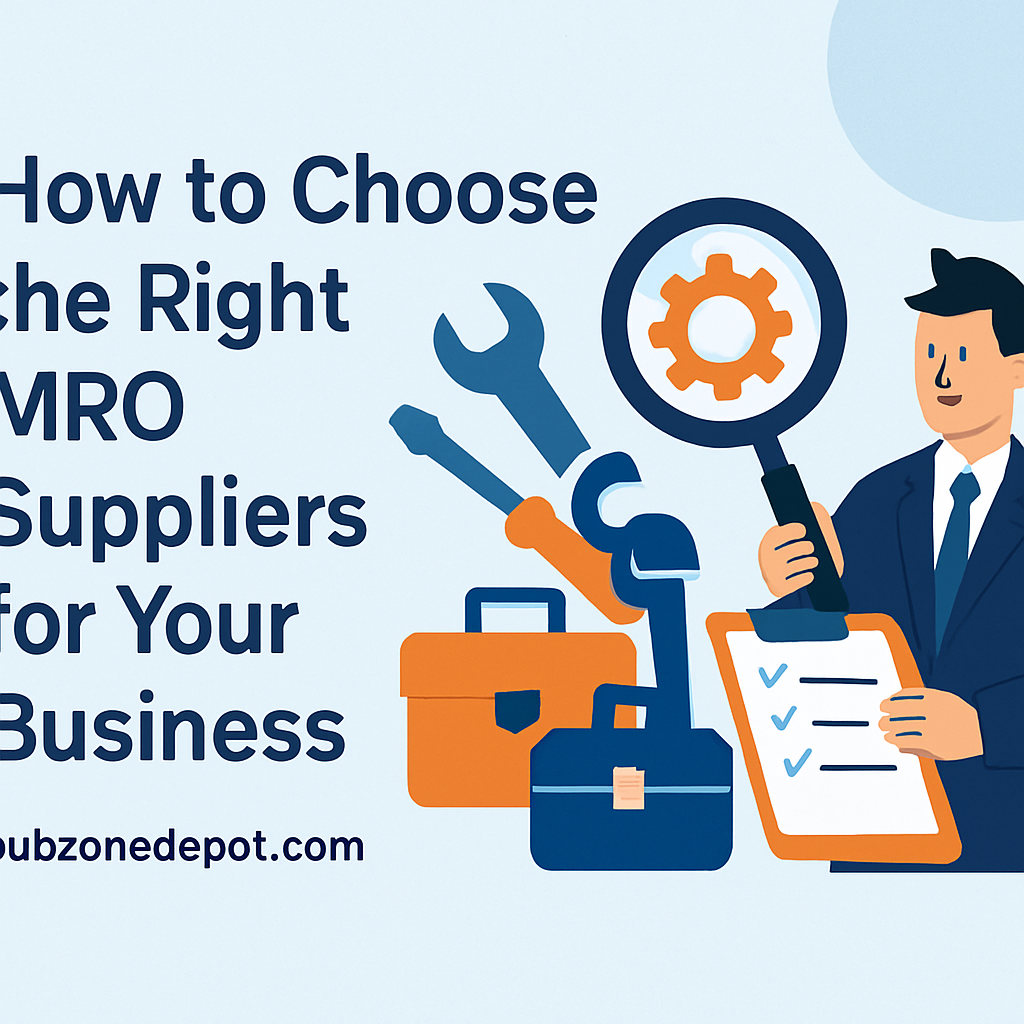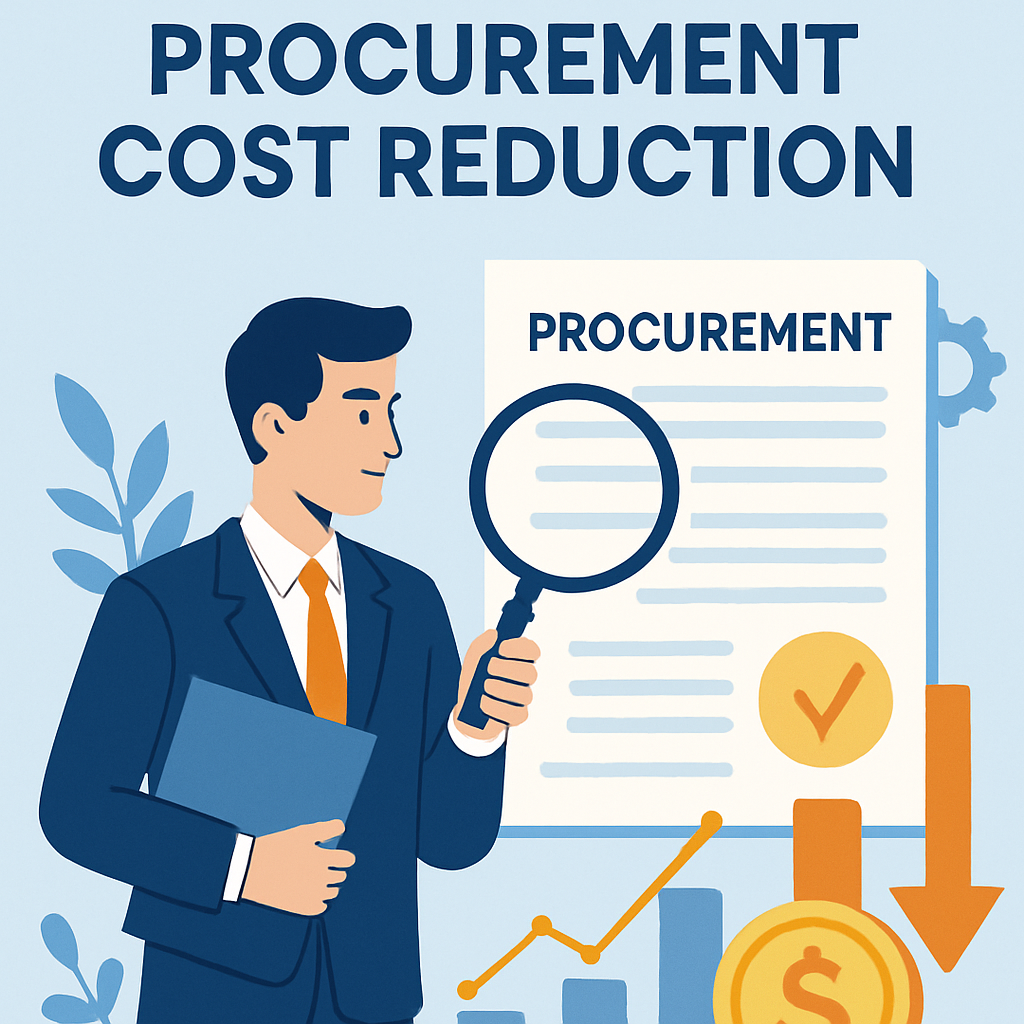The Strategic Role of an MRO Buyer in Modern Business
Introduction
Welcome to the world of MRO procurement, where the unsung heroes of business operations quietly keep the wheels turning. If you’ve ever wondered who ensures that your industrial supplies are stocked, your maintenance repair operations run smoothly, and your facility is always ready for action, look no further than the MRO buyer.
In today’s fast-paced business environment, the role of an MRO buyer has evolved from mere purchasing to a strategic powerhouse. Think of them as the conductors of a symphony, orchestrating everything from maintenance procurement to MRO inventory management. They’re not just checking boxes; they’re crafting strategies that optimize supply chains and reduce costs.
But what exactly does it take to be an effective maintenance repair and operations buyer? In this post, we will dive deep into the multifaceted responsibilities of MRO buyers, explore cutting-edge sourcing strategies, and uncover how they navigate the complexities of vendor management. Spoiler alert: It’s not just about finding the cheapest spare parts!
Key Takeaway: The strategic role of an MRO buyer is crucial for operational efficiency in modern businesses. Mastering this role can lead to significant cost reductions and improved supplier relationships.

So grab your hard hat and safety goggles as we embark on this journey through the intricate world of MRO procurement. By the end, you’ll see why these buyers are more than just operational supplies buyers they’re essential players in driving business success!
Understanding the Role of an MRO Buyer
So, what exactly is an MRO buyer? Think of them as the unsung heroes of the supply chain, the ones who keep the wheels turning in industrial operations. An MRO buyer is a maintenance, repair, and operations buyer responsible for sourcing and purchasing all those essential items that keep a facility running smoothly.
An MRO buyer plays a crucial role in ensuring that maintenance and operational needs are met without breaking the bank. They navigate the complex world of MRO procurement, making strategic decisions that impact everything from inventory management to vendor relationships.
Importance in the Supply Chain
The importance of an MRO buyer in the supply chain cannot be overstated. They are essentially the glue that holds together various elements of MRO supply chain management. Without them, companies could face delays, increased downtime, and inflated costs due to inefficient purchasing practices.
Key Responsibilities and Functions
MRO buyers wear many hats think of them as multi-tasking ninjas in procurement. Here are some key responsibilities they typically handle:
- MRO Purchasing: Identifying and acquiring necessary supplies like tools, spare parts, and safety equipment.
- MRO Sourcing Strategies: Developing effective strategies to source materials at competitive prices while maintaining quality.
- MRO Vendor Management: Building strong relationships with suppliers to ensure reliable delivery and favorable terms.
- MRO Cost Reduction: Implementing strategies for cost savings without compromising on quality or service levels.
- MRO Inventory Management: Keeping track of stock levels to avoid shortages or overstock situations.
In essence, an MRO buyer’s role is about balancing efficiency with cost-effectiveness. They leverage data-driven insights to make informed decisions that enhance operational efficiency while managing indirect spend effectively.
MRO Procurement Processes
In the bustling world of maintenance, repair, and operations (MRO), the role of an MRO buyer is akin to that of a conductor leading a symphony. Each procurement process is a note in the grand composition of operational efficiency. Let’s dive into the key elements that define effective MRO procurement processes.
MRO Sourcing Strategies
Strategic sourcing is not just about finding the lowest price; it’s about finding value. An effective MRO sourcing strategy involves:
- Identifying Needs: Understand what your facility requires in terms of maintenance supplies to avoid over-purchasing or stockouts.
- Market Analysis: Research suppliers and assess their capabilities, pricing structures, and reliability.
- Supplier Diversification: Avoid relying on a single vendor; having multiple suppliers can mitigate risks and enhance negotiation power.
MRO Vendor Management Techniques
A strong relationship with suppliers can be the difference between smooth operations and chaotic disruptions. Here are some techniques for effective MRO vendor management:
- Regular Performance Reviews: Evaluate vendor performance based on delivery timelines, quality of goods, and responsiveness.
- Clear Communication Channels: Establish open lines of communication for feedback and issue resolution.
- Collaborative Planning: Work together on forecasts to ensure timely availability of critical supplies.
MRO Contracts Negotiation Best Practices
Navigating contracts can feel like a high-stakes poker game. To ensure you’re not left with a bad hand, consider these best practices for MRO contracts negotiation:
- Know Your Market: Understand current market conditions to leverage better terms.
- Clearly Define Terms: Ensure all expectations are documented clearly to avoid misunderstandings down the line.
- Aim for Win-Win Solutions: Strive for agreements that benefit both parties to foster long-term relationships.
Key Takeaway: The MRO procurement process is not merely transactional; it’s strategic. By mastering sourcing strategies, vendor management techniques, and contract negotiations, an MRO buyer can significantly enhance operational efficiency while reducing costs.

MRO Inventory Management and Control
When it comes to keeping the wheels of industry turning smoothly, MRO inventory management is like the oil in an engine essential for operational efficiency. An effective MRO buyer knows that managing spare parts and maintenance supplies isn’t just about having enough stock; it’s about having the right stock at the right time.
Spare Parts Inventory Control Methods
One of the biggest challenges for an MRO buyer is ensuring that spare parts are available when they’re needed. Here are some methods that can help:
- Just-in-Time (JIT) Inventory: This strategy minimizes inventory costs by ordering parts only as they’re needed, reducing storage space and waste.
- ABC Analysis: Categorizing inventory into three classes (A, B, and C) based on importance helps prioritize management efforts. Class A items are critical, while Class C items are less so.
- Safety Stock Levels: Maintaining a buffer stock to prevent shortages during unexpected demand spikes or supply chain disruptions.
Strategies for MRO Supply Chain Management
The connection between MRO procurement and supply chain management is like a well-choreographed dance; every step must be in sync. Here’s how to keep your supply chain flowing:
- Diversified Sourcing: Don’t put all your eggs in one basket! Using multiple suppliers can mitigate risks associated with single-source dependencies.
- Data-Driven Decision Making: Utilize analytics tools to forecast demand accurately and adjust purchasing strategies accordingly.
- Sustainability Practices: Opt for suppliers who prioritize eco-friendly practices, which can enhance brand reputation while also possibly lowering costs over time.
Operational Efficiency in Inventory Management
An efficient inventory management system is like a well-oiled machine it reduces downtime and enhances productivity. Here’s how MRO buyers can achieve operational efficiency:
- Automated Reordering Systems: Implementing software solutions that automatically reorder supplies once they hit a predefined threshold saves time and reduces human error.
- MRO Logistics Coordination: Streamlining logistics processes ensures timely delivery of supplies, which is crucial for maintaining operational flow.
- MRO Category Management: By categorizing maintenance supplies effectively, buyers can optimize procurement strategies tailored to specific needs, enhancing overall efficiency.
Did you know? Effective MRO inventory management can reduce overall operational costs by up to 20%, making it a smart investment for any business!
The role of an MRO buyer extends far beyond simply placing orders; it involves strategic thinking, relationship building with suppliers, and constant adaptation to changing market conditions. By mastering these elements of inventory management and control, you’ll not only keep your operations running smoothly but also contribute significantly to your organization’s bottom line. So gear up it’s time to ensure your MRO purchasing strategy is as sharp as a tack!
Cost Reduction Strategies for MRO Purchasers
As an MRO buyer, your mission should you choose to accept it is to not only keep the wheels of industry turning but to do so while trimming the fat from your budget. Think of yourself as the culinary mastermind in a high-stakes cooking competition, where every ingredient counts and cost-efficiency is the secret sauce!
MRO Cost Reduction Techniques
Here are some deliciously effective strategies to whip up those savings:
- Bulk Purchasing: Buying in bulk can lead to significant discounts. Just like stocking up on toilet paper during a pandemic, the more you buy, the less you pay per unit!
- Consolidate Suppliers: Fewer suppliers mean less complexity and better negotiation power. It’s like having fewer cooks in the kitchen less chance for chaos!
- Standardization of Parts: Using standardized parts across multiple machines can reduce costs and simplify inventory management. Think of it as finding that one universal remote that controls everything pure bliss!
Indirect Spend Management in MRO Procurement
Diving into indirect spend can feel like searching for hidden treasures in your backyard. Here’s how you can manage it effectively:
- Audit Current Spending: Regular audits can help identify areas where money is leaking faster than a sinking ship. Use data analytics to spot trends that might be costing you.
- Implement a Purchase Order System: This ensures all purchases are tracked and approved, minimizing rogue spending. It’s like having a bouncer at the door of your budget party!
- Negotiate with Vendors: Don’t be afraid to ask for better terms or discounts based on your purchasing volume or loyalty. After all, who doesn’t love a good deal?
Vendor Performance Evaluation for Cost Savings
Your vendors are like partners in a dance if they’re stepping on your toes, it’s time for a performance review! Here’s how to evaluate their effectiveness:
- Create Key Performance Indicators (KPIs): Establish measurable KPIs such as delivery time, quality of goods, and pricing consistency.
- Regular Reviews: Schedule regular check-ins with vendors to discuss performance metrics and explore areas for improvement.
- Sourcing Alternatives: Keep an eye on market trends and have backup suppliers ready. It’s always good to have options in case your main partner starts dancing offbeat!
Takeaway: Implementing these cost reduction strategies not only enhances your MRO procurement efficiency but also strengthens your position as an invaluable asset within your organization. Remember, saving money is just as important as spending wisely!

The Importance of Supplier Relationships in MRO Purchasing
When it comes to MRO purchasing, think of your suppliers as your trusty sidekicks in a superhero movie. They’re not just there to deliver goods; they play a critical role in the success of your operations. Building strong supplier relationships is like having a well-oiled machine everything runs smoother when each part works harmoniously.
MRO Supplier Relationship Management Strategies
Effective MRO supplier relationship management (SRM) is essential for any MRO buyer. Here are some strategies that can help:
- Regular Communication: Keep the lines open! Regular check-ins can help address issues before they become big problems.
- Performance Metrics: Develop KPIs to assess vendor performance. Think of it as a report card for your suppliers.
- Feedback Loops: Establish mechanisms for giving and receiving feedback. This promotes continuous improvement on both sides.
Benefits of Strong Vendor Partnerships
A solid relationship with suppliers can lead to numerous benefits, including:
- Cost Savings: Strong partnerships often yield better pricing and terms, which is music to any MRO buyer’s ears.
- Quality Assurance: Reliable suppliers tend to provide consistent quality, reducing the risk of operational hiccups.
- Innovation Opportunities: Collaborative relationships can lead to innovative solutions tailored to your business needs.
Cultivating Long-Term Supplier Collaborations
Cultivating long-term collaborations isn’t just about signing contracts; it’s about creating partnerships that thrive over time. Here’s how you can do this effectively:
- Invest in Relationships: Attend supplier events or invite them for facility tours show them they’re more than just a transaction.
- Joint Problem Solving: Work together on challenges. When both parties invest time and resources into solving issues, it strengthens the bond.
- Loyalty Programs: Consider implementing loyalty programs that reward consistent suppliers with additional business opportunities or incentives.
Key Takeaway: Strong supplier relationships are not just beneficial they’re essential for effective MRO procurement. By investing in these relationships, you enhance operational efficiency and drive cost reductions while mitigating risks associated with supply chain disruptions.
The Future of MRO Procurement in Modern Business Environments
As we peer into the crystal ball of MRO procurement, it’s clear that the role of the MRO buyer is evolving faster than a cat meme goes viral. With rapid advancements in technology and shifting market dynamics, modern business environments are reshaping how maintenance, repair, and operations (MRO) are approached.
Trends Impacting MRO Buying Decisions
So what’s trending in the world of MRO procurement? Here are a few key trends that every maintenance procurement specialist should keep an eye on:
- Digital Transformation: From e-procurement platforms to AI-driven analytics, technology is streamlining processes and enhancing decision-making.
- Sustainability Initiatives: More companies are prioritizing green practices in their supply chains. This means sourcing eco-friendly products and reducing waste in MRO purchasing.
- Data-Driven Insights: Utilizing big data for predictive maintenance can help buyers anticipate needs and optimize inventory levels.
The Role of Technology in MRO Procurement Optimization
The rise of tech-savvy solutions is like giving an MRO buyer a superhero cape. Here’s how technology is transforming the landscape:
- Automated Inventory Management: Tools that automate stock tracking can help maintain optimal levels without overstocking or running out of critical supplies.
- MRO Logistics Coordination: Advanced logistics software allows for real-time tracking of shipments, ensuring timely delivery and enhancing operational efficiency.
- E-Sourcing Platforms: These platforms enable buyers to compare multiple suppliers quickly, ensuring they get the best deals without endless back-and-forth communication.
Sustainability Considerations in MRO Purchasing Practices
Sustainability isn’t just a buzzword; it’s becoming a core component of strategic sourcing for maintenance supplies buyers. Companies are increasingly recognizing that sustainable practices can lead to cost savings and improved brand reputation. Here’s how:
- Sourcing from Eco-Friendly Suppliers: Building relationships with suppliers who prioritize sustainability can enhance your company’s green credentials.
- Lifecycle Cost Analysis: Evaluating products based on their entire lifecycle production, use, and disposal can lead to smarter purchasing decisions that benefit both the environment and your bottom line.
- Circular Economy Practices: Embracing practices like recycling materials or reusing spare parts can significantly reduce waste and costs associated with new purchases.
Key Takeaway: The future of MRO procurement lies at the intersection of technology, sustainability, and strategic supplier relationships. By adapting to these changes, MRO buyers can not only improve operational efficiency but also contribute positively to their organizations’ overall goals.

Conclusion
As we wrap up our exploration of the strategic role of an MRO buyer, it’s clear that this position is not just about purchasing supplies it’s a critical function that directly impacts operational efficiency and cost management. In a world where every dollar counts, the savvy maintenance, repair, and operations buyer must be equipped with an arsenal of MRO sourcing strategies and vendor management techniques.
Understanding the nuances of MRO procurement processes is essential for anyone looking to excel in this field. From mastering contracts negotiation to optimizing inventory management, each aspect plays a vital role in ensuring that businesses can maintain their operations without unnecessary interruptions or inflated costs.
Remember:
- Strong supplier relationships can lead to better pricing and more reliable service.
- Effective MRO inventory management is crucial for minimizing downtime.
- Cost reduction strategies should be continuously evaluated to keep indirect spend in check.
The future of MRO procurement looks bright, with technology paving the way for smarter decisions and more sustainable practices. Embracing these changes will not only enhance your capabilities as an industrial supplies buyer but also position your organization as a leader in operational excellence.
So, whether you’re a seasoned professional or just stepping into the world of MRO purchasing, remember that your role is pivotal. By leveraging strategic sourcing for maintenance supplies and focusing on effective vendor performance evaluation, you can contribute significantly to your company’s bottom line. Now go forth and conquer that supply chain!



